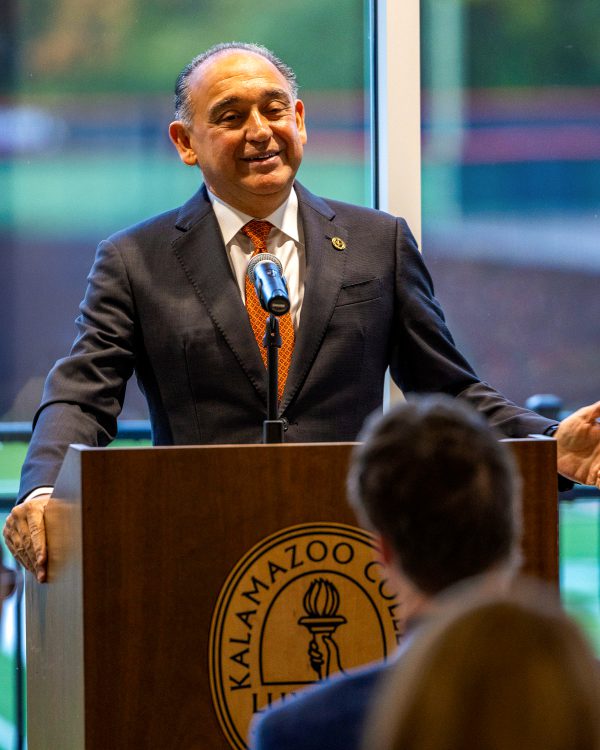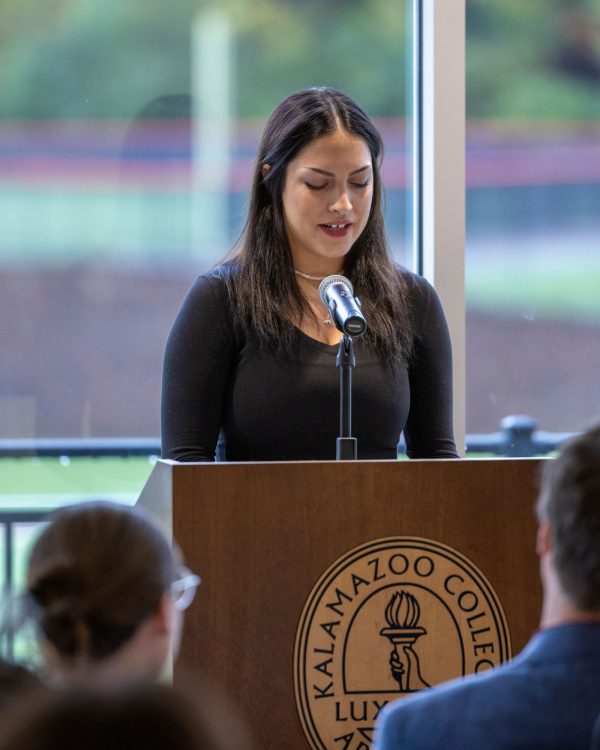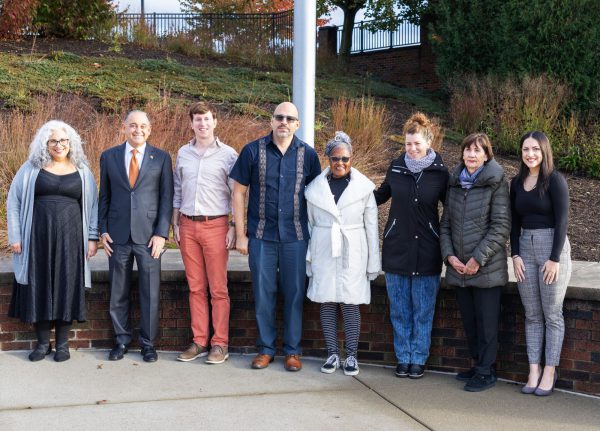Kalamazoo College welcomed local and state officials, business leaders, community partners and friends to campus on Friday, October 24, for the College’s annual Community Breakfast. The event brought together representatives from more than 40 organizations, reflecting the strong relationships that connect K with the greater Kalamazoo area.
Each year, the College partners with local schools, nonprofits, and businesses to strengthen the region through learning, service, and collaboration. From community-based courses and paid internships to arts performances, athletics, and sustainability initiatives, the College generates both social and economic impact in Kalamazoo—contributing financially to the local economy, hosting events that drive tourism, and preparing graduates who continue to live and work in the area. Together, these efforts reflect K’s centuries-long role as an anchor institution and a contributor to the community’s growth and sustainability.
In his remarks, President Jorge G. Gonzalez, who will retire from the institution in June, reflected on the progress K has made since the start of his tenure.
“In the decade since I came to K, a lot has changed—new programs, new partnerships, new challenges,” Gonzalez said. “But one thing has remained the same: Kalamazoo College’s unwavering commitment to preparing students for lives of meaning and impact.”
Gonzalez shared that nearly 1,300 students began classes this fall, including 341 first-year students representing 20 states and six countries. The class is one of the most diverse in recent history, including 33% who are first-generation college students and 37% who are Pell Grant eligible, highlighting the College’s commitment to providing access to students of all backgrounds.
While K’s student body comes from across the U.S. and around the world, Gonzalez noted that K is home to 85 Kalamazoo Promise students who graduated from the Kalamazoo Public Schools, as well 26 Heyl Scholars. These numbers underscore K’s work to show local students that they can experience a transformative education and global opportunities right here in Kalamazoo.
These experiences were highlighted when Gonzalez recognized the conclusion of a four-year, $1.297 million initiative supported by the Andrew W. Mellon Foundation. Envisioned by Associate Professor of English Shanna Salinas, Associate Professor of Sociology Francisco Villegas and Professor Emeritus of English Bruce Mills, the HILL project fostered site-based collaboration among students, faculty, and community partners in Kalamazoo, New Orleans, St. Louis, and San Diego, exploring how the humanities engage with place, displacement, and community.
Several representatives of those community partners were in attendance at the breakfast as they kicked off a weekend-long conference to mark the project’s culmination.
Of the HILL project, Gonzalez said, “Students had the chance to step out of the classroom, partner with organizations here in Kalamazoo and across the country and see firsthand how their scholarship can make a difference.”
This experience was highlighted by recent graduate Melissa Preston ’25, a Kalamazoo native and critical ethnic studies and French double major who participated in the HILL project and traveled to New Orleans with the program.
“It’s one thing to learn about history, but I believe it is even more crucial to live, to see, to experience the reality these histories created,” Preston said. “My time in New Orleans was incredible; everything that we saw, learned, tasted, heard, did, and experienced was so rich. This experience was truly monumental in my own academic journey.”
Today, Preston is a bilingual teller at a local credit union, where she assists Francophone members throughout the state of Michigan. She noted that her experiences at K within an interdisciplinary program, “challenged me to rethink my own thought processes, sharpened my critical thinking and shaped my empathy toward others. It fueled my passion for learning, growing and always asking why…It exemplifies the liberal arts model and sets K apart in a way that should be supported and celebrated.”
Gonzalez closed the program by urging attendees to continue investing in education and the partnerships that make transformative experiences possible for college students like Preston.
“So many indicators of success—wealth, health, upward mobility, involved citizenship—trace back to education,” he said. “It is the foundation upon which individuals and communities rise…We can teach, we can inspire, we can communicate value, but we cannot do it alone. Our colleges and universities are ultimately community efforts.”



